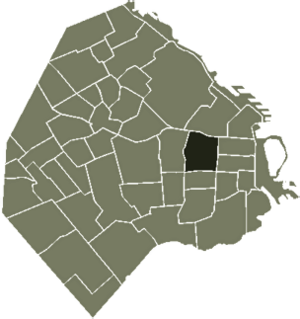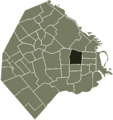Battle of Miserere facts for kids
Quick facts for kids Battle of Miserere |
|||||||
|---|---|---|---|---|---|---|---|
| Part of the Napoleonic Wars | |||||||
 |
|||||||
|
|||||||
| Belligerents | |||||||
| Commanders and leaders | |||||||
| Santiago de Liniers Bernardo de Velasco Juan Pío de Gana |
John Whitelocke Robert Craufurd Denis Pack John Levison Gower John Squire |
||||||
| Units involved | |||||||
| Regimiento Fijo de Buenos Aires Tercio de Vizcaínos Batallón de Arribeños Tercio de Miñones de Cataluña Cuerpo de Blandengues. |
95th Rifle Regiment 36th Regiment of Foot |
||||||
| Strength | |||||||
| 1300 militiamen | 900 soldiers | ||||||
The Battle of Miserere was an important fight during the second British invasion of the Río de la Plata. This battle happened on July 2, 1807. It took place in what is now Miserere Square in the Balvanera neighborhood of Buenos Aires.
The battle was fought between British troops, led by General John Whitelocke, and Spanish forces. The Spanish forces were commanded by Santiago de Liniers. Even though the British won this battle, it was just one part of a larger conflict. This conflict would decide who controlled the important city of Buenos Aires.
Contents
Why the British Invaded
The British invasions of the Río de la Plata were part of the bigger Napoleonic Wars. During this time, Great Britain and Spain were enemies. Spain was allied with France, led by Napoleon Bonaparte. The British wanted to weaken Spain and gain new trade routes.
First Invasion (1806)
In 1806, the British tried to invade Buenos Aires for the first time. They managed to capture the city. However, local forces, led by Santiago de Liniers, quickly fought back. They forced the British to surrender and leave. This victory showed the people of Buenos Aires that they could defend themselves.
Second Invasion Begins (1807)
Despite their first defeat, the British decided to try again in 1807. They sent a much larger army, led by General John Whitelocke. Their goal was to capture Buenos Aires and control the region. The British landed near Buenos Aires and began their march towards the city.
The Battle at Miserere
As the British army approached Buenos Aires, the Spanish forces prepared to defend the city. The main clash happened at a place called Corrales de Miserere. This area was just outside the city walls.
British Advance
On July 2, 1807, the British forces marched towards Buenos Aires. They were divided into several columns. One important column was led by General Robert Craufurd. His troops were the first to meet the Spanish defenders.
Spanish Defense
Santiago de Liniers, the Spanish commander, had gathered his troops. These included regular soldiers and local militiamen. They were ready to stop the British advance. Liniers positioned his forces to block the roads leading into the city.
The Fight
The battle began early in the morning. The British, with their well-trained soldiers, attacked the Spanish lines. The fighting was fierce. The Spanish forces, though brave, were outnumbered and outgunned in this initial clash.
- The British used their superior training and weapons.
- The Spanish fought hard but were pushed back.
- General Craufurd's column played a key role in the British victory.
The British managed to break through the Spanish defenses. They forced Liniers's troops to retreat into the city. This victory at Miserere opened the way for the British to enter Buenos Aires.
Aftermath of Miserere
The Battle of Miserere was a clear British victory. It allowed them to reach the city of Buenos Aires. However, the fight for the city was far from over.
Entering Buenos Aires
After their win at Miserere, the British army entered Buenos Aires. They expected the city to surrender easily. But the people of Buenos Aires had prepared for a street-by-street defense.
The Main Battle for Buenos Aires
The real fight for Buenos Aires happened on July 5, 1807. The British tried to capture the city block by block. However, the citizens and militiamen fought bravely from their homes and rooftops. They threw stones, hot water, and fired muskets at the British soldiers.
The British suffered heavy losses. General Whitelocke realized that capturing the city would be too costly. He decided to negotiate.
British Surrender
On July 7, 1807, General Whitelocke signed a surrender agreement. The British agreed to leave Buenos Aires and withdraw all their forces from the Río de la Plata region. This marked the end of the British invasions.
Legacy
The British invasions, including the Battle of Miserere, had a big impact.
- They showed the people of Buenos Aires that they could defend themselves.
- They increased the desire for independence from Spain.
- Many local leaders, like Santiago de Liniers, became heroes.
These events helped set the stage for Argentina's future independence movement.
Images for kids
 | Mary Eliza Mahoney |
 | Susie King Taylor |
 | Ida Gray |
 | Eliza Ann Grier |


